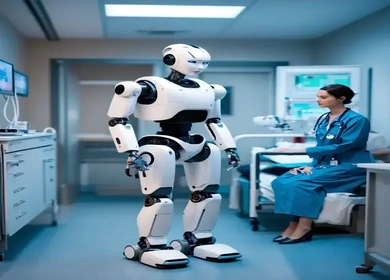Embracing the Future: How AI is Revolutionizing Healthcare
Introduction: The Promise of Artificial Intelligence in Healthcare, In recent years, Artificial Intelligence (AI) has emerged as a transformative force across various industries, with healthcare standing out as one of the most promising fields. AI's ability to analyze vast amounts of data, learn from it, and provide insights is revolutionizing how medical professionals diagnose, treat, and manage diseases. From early diagnosis to personalized treatment plans, AI is poised to make healthcare more efficient, accurate, and accessible. In this blog post, we will explore the latest advancements in AI in healthcare and how they are set to benefit humanity.
1. Early Diagnosis and Predictive Analytics
One of the most significant impacts of AI in healthcare is its potential for early diagnosis and predictive analytics. AI algorithms can analyze medical records, imaging, and genetic data to identify patterns that may indicate the early stages of diseases such as cancer, heart disease, and diabetes. For instance, AI-powered tools can detect subtle changes in mammograms that might be missed by the human eye, leading to earlier and more accurate breast cancer diagnoses.
Predictive analytics also play a crucial role in anticipating disease outbreaks and managing chronic conditions. By analyzing data from wearable devices, electronic health records, and other sources, AI can predict potential health issues before they become critical, allowing for timely interventions and improved patient outcomes.
2. Personalized Medicine and Treatment Plans
AI is also revolutionizing the field of personalized medicine. Traditional treatment plans often follow a one-size-fits-all approach, which may not be effective for every patient. AI, however, can analyze a patient's genetic information, lifestyle, and medical history to create tailored treatment plans. This personalized approach ensures that patients receive the most effective treatments with minimal side effects.
For example, AI algorithms can help oncologists determine the most effective combination of therapies for cancer patients based on their genetic makeup and tumor characteristics. This not only improves treatment efficacy but also enhances the patient's quality of life by reducing the likelihood of adverse reactions.
3. Enhancing Medical Imaging and Diagnostics
Medical imaging is a critical component of modern healthcare, and AI is making significant strides in this area. AI-powered image recognition systems can analyze X-rays, MRIs, CT scans, and other imaging modalities with remarkable accuracy. These systems can detect abnormalities, measure tumor sizes, and even differentiate between benign and malignant growths.
Moreover, AI can assist radiologists by highlighting areas of concern, reducing the chances of oversight, and speeding up the diagnostic process. This not only enhances diagnostic accuracy but also allows radiologists to focus on more complex cases that require their expertise.
4. Drug Discovery and Development
The process of drug discovery and development is time-consuming and expensive, often taking years and billions of dollars to bring a new drug to market. AI has the potential to accelerate this process by identifying promising drug candidates more quickly and accurately. Machine learning algorithms can analyze vast datasets of chemical compounds, biological targets, and clinical trial results to predict which combinations are most likely to be effective.
AI can also help design and optimize clinical trials, identifying suitable patient populations and predicting potential side effects. This not only speeds up the development of new treatments but also reduces costs and increases the likelihood of success.
5. Improving Patient Care and Management
AI is transforming patient care and management by enabling more efficient and personalized healthcare delivery. Virtual health assistants, powered by AI, can provide patients with 24/7 support, answering their questions, reminding them to take medications, and monitoring their health status. These virtual assistants can also triage symptoms and provide preliminary diagnoses, helping patients decide whether they need to seek medical attention.
In hospitals, AI can optimize resource allocation, predict patient admission rates, and streamline administrative tasks, allowing healthcare providers to focus more on patient care. Additionally, AI-powered robots are being used in surgeries to enhance precision and reduce recovery times.
6. Addressing Ethical and Privacy Concerns
While the benefits of AI in healthcare are undeniable, it is essential to address ethical and privacy concerns. Ensuring that AI systems are transparent, unbiased, and secure is crucial for maintaining patient trust and safeguarding sensitive health information. Regulatory frameworks and guidelines are being developed to ensure that AI is used responsibly and ethically in healthcare settings.
Conclusion: A Healthier Future with AI
The integration of AI in healthcare is ushering in a new era of medical innovation, promising more accurate diagnoses, personalized treatments, and improved patient care. As AI technology continues to evolve, its potential to transform healthcare and enhance human well-being becomes increasingly evident. By embracing AI, we can look forward to a future where healthcare is more efficient, accessible, and tailored to individual needs.




_1725587649.webp)
_1725588033.webp)


_1725588723.webp)